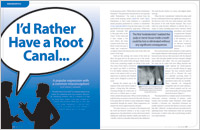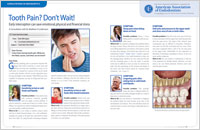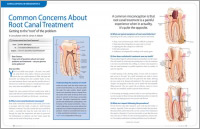
Steps away from TTC St. Clair Station at Yonge and St. Clair

At the core of your tooth there is an area called the pulp. The pulp is the nerve of your tooth, where blood and nutrients circulate. If the pulp is damaged, it becomes susceptible to infection and can result in pain, swelling, bone damage and tooth loss.Gingivitis left untreated can spread to the bone structure that supports your teeth. This is where periodontal disease sets in. As the infection progresses ‘pocket’ are formed between your tooth and gum, allowing tartar, bacterial and infection to accumulate and damage the underlying bone. As the Periodontitis advances the ‘pockets’ deepen allowing the infection to worsen and damage to increase.To save an original tooth and avoid problems associated with damaged pulp, Root Canal Therapy is often an option. Root Canal Therapy can prevent the need for more costly procedures, such as an implant or denture.
The Root Canal Therapy process involves creating an opening in the crown of the tooth. The pulp in the ‘root canal’ is completely removed and the ‘canal’ is cleaned out, shaped and smoothed. Any infection (abscess) is treated and the bacteria that cause it are cleaned out. The canal area, free of infection free is filled and sealed. As the tooth will no longer be receiving vital nutrients it will be more brittle than surrounding teeth. For this reason we create a Crown or Cap to strengthen and protect your tooth’s chewing surface, especially if it was one of your back teeth.
A root canal involves a few visits to our office as the procedure is done in stages to allow for proper healing and to ensure that all potential infection is gone.
What to look for:
 “I’d Rather Have a Root Canal…”
“I’d Rather Have a Root Canal…”
A common misconception is demystified. Get the real story about this much maligned procedure that eases pain, rather than causes it… Read Article
 Tooth Pain? Don’t Wait!
Tooth Pain? Don’t Wait!
Pain is a protective response that ranges from minor sensitivity to severe pain and informs the body that something is wrong. As for tooth pain, it is caused by a reaction of the nerves inside a tooth’s pulp chamber with the severity dependent upon the type and degree of the stimulus… Read Article
 Common Concerns About Root Canal Treatments
Common Concerns About Root Canal Treatments
Getting to the “root” of the problem. Get the real story about this much maligned procedure that eases pain, rather than causes it… Read Article